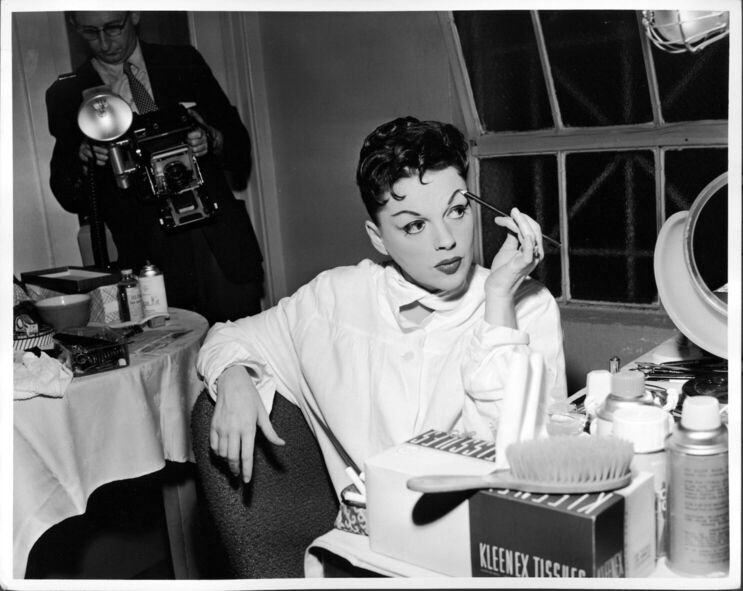Judy Garland as a gay icon
By Jake Tickle, Third Year English
“The only time I felt accepted or wanted was when I was on stage performing. I guess the stage was my only friend: the only place where I could feel comfortable. It was the only place where I felt equal and safe.”
Judy Garland
From the nineteenth century adoration for the operatic ‘prime donne’, to the twentieth century Hollywood stars and the twenty-first century pop goddesses, queer people have always had an enthusiasm for divas. The rise of the diva is steeped in history, and their nuanced relationship with their queer fans has been around for just as long.
Of course, each diva has their own fanbase and I simply cannot cover all of them, so I will be taking a closer look at just one of my all-time favourites, Judy Garland.
I find Garland’s career particularly interesting; it has been defined by so many highs and lows – she had suffered just as her marginalised audiences had, and that is what made her resonate so widely with her fans. Garland’s breakout role as Dorothy in The Wizard of Oz is what she is most known for, but it wasn’t until well into her career that she was solidified as a gay icon/diva.
Judy Garland had gone through multiple divorces as well as a mental health issues and suicide attempts in the public eye. Her struggles were juxtaposed by her tenacity and her ability to not only survive, but to flourish on the stage. This unapologetic determination to continue surviving resonated with her queer audience, as well as other marginalised groups.
If you are a fan of Garland’s and have not listened to the live album Judy at Carnegie Hall, I urge you to do so right now. It is almost impossible to articulate her sound, and there is nothing quite like it, especially in this album. Judy at Carnegie Hall is a recording of her performance at the renowned venue, where the 38-year-old sang the roof off in front of her loyal fans, including Marilyn Monroe. The album was released a couple of months later, winning 5 Grammy awards. It is like a time capsule that takes you right to that night in 1961 – you can listen to her voice explode on stage in her dramatic numbers, whilst listening to her gentle and kind voice in between songs when she talks to the audience. It is truly astonishing.
Of course, that night, like so many other of her performances, was filled with her queer fans (you can hear them screaming ‘we love you Judy’ throughout the performance), who felt like she was a true friend, one who understood and loved them back. At face value, it seems arbitrary that the Over the Rainbow singer would have been such an influence in the queer world, but upon investigation, it is no surprise. When asked if she minded having such a large gay following – as if she ever would – Garland responded by saying: “I couldn’t care less. I sing to people!” So many of her queer fans had suffered, living mostly in the shadows from fear of persecution and homophobia, and yet Judy had created a space that was safe and accepting by simply showing kindness and a mutual understanding of pain.
There are also debates over how much her death played into one of the most influential social movements in history – Stonewall. Her untimely death occurred on the 22nd of June 1969 due to an accidental overdose on medication she had been taking since she was young, just six days before the start of the Stonewall riots. What’s more, Garland’s funeral was held on the 27th of June, the evening before the Stonewall riots in the early hours of the 28th of June. Many claim that the heightened emotions caused by Garland’s funeral earlier that day, just 4 miles from the Stonewall Inn in Greenwich village, provided some sort of spark that caused the riots to reach the scale that they did. The Stonewall riots were of course not caused by one single event or person, however I do agree that it is highly likely Judy Garland’s funeral just hours before played some part.
This ‘diva worship’ exists across many communities, including many influential famous women, from Lady Gaga, Diana Ross, even Garland’s daughter Liza Minnelli, and has existed as a way for marginalised communities to feel loved and accepted in a world that does not make them feel welcome. It is an almost ineffable way of projecting one’s insecurities and suffering, turning it into joy and pure camp expression. Just like many others, Judy Garland’s legacy lives on; she is constantly used as a reference in queer language and art. From the phrase ‘friend of Dorothy’ used as code for gay men, to drag impersonations of Garland, she will always live on as a culturally significant figure in LGBTQ+ history.

